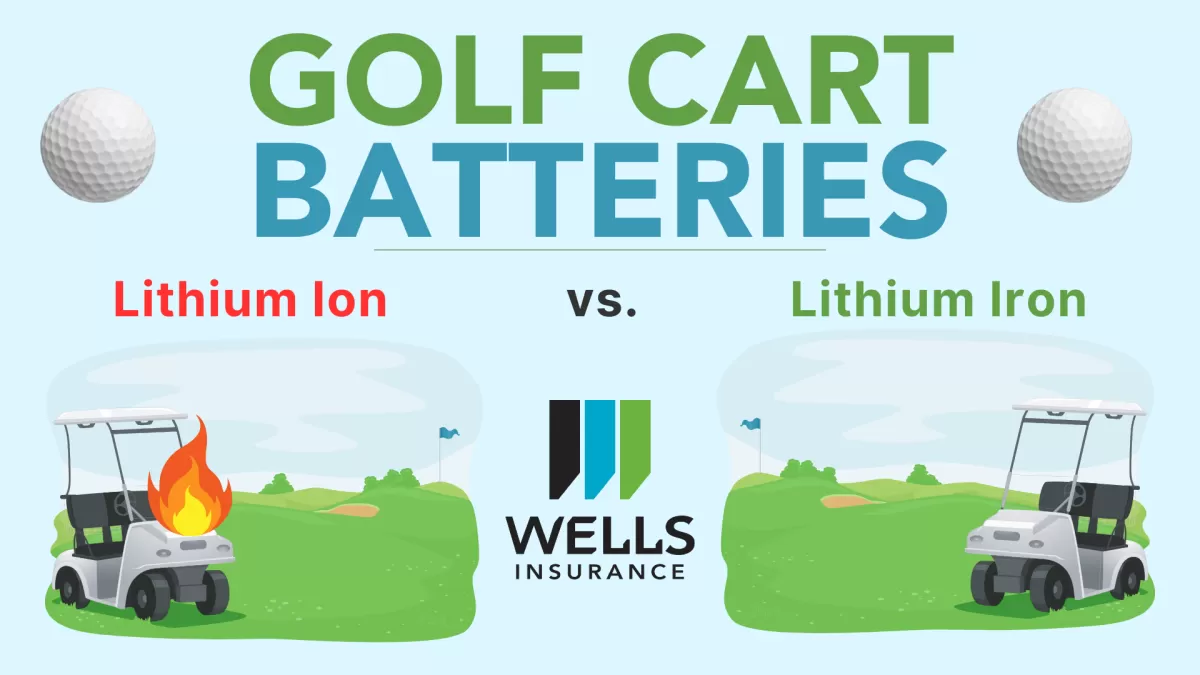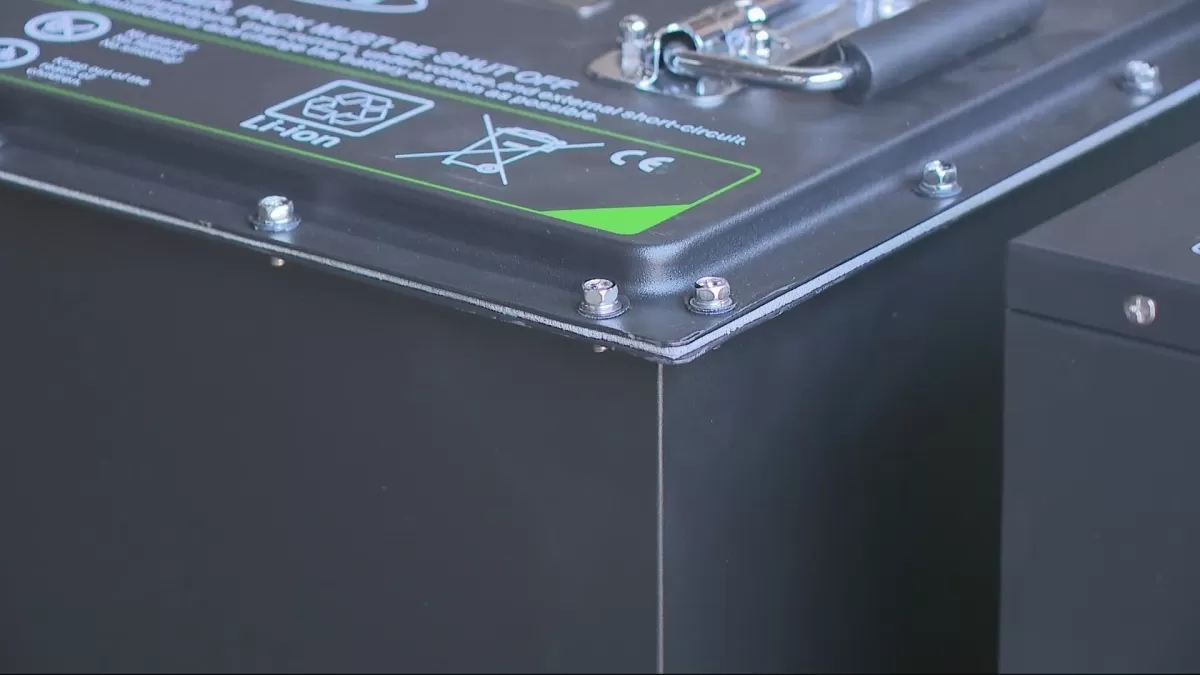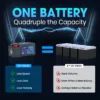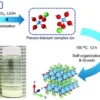Are you wondering if lithium golf cart batteries are a fire hazard? With reports of battery-related fires making headlines, it’s natural to question the safety of these powerful energy sources.
As a golf cart owner, I understand the importance of choosing reliable batteries that keep you cruising worry-free. That’s why I’ve compiled this no-nonsense guide based on real-world insights and Li-ess expertise.
In this post, you’ll discover the truth about lithium battery fire risks, learn practical safety tips, and see why LiFePO4 batteries from Li-ess are a game-changer for golf cart safety.
Let’s dive in and put your concerns to rest!
Understanding Lithium Golf Cart Batteries
What Are Lithium Golf Cart Batteries
Lithium golf cart batteries are rechargeable power sources designed specifically for golf carts, using lithium-ion technology instead of the traditional lead-acid chemistry. They are known for being lighter, longer-lasting, and more efficient, which can improve the cart’s performance and battery life. Many lithium batteries used today are LiFePO4 (lithium iron phosphate), a type of lithium-ion battery known for better stability and safety compared to older lithium variants.
Why the Fire Hazard Concern
When it comes to lithium golf cart battery safety, fire concerns often make people nervous. Lithium batteries, especially older or poorly made ones, can pose fire hazards due to thermal runaway—a chain reaction that causes batteries to overheat, catch fire, or even explode. This risk is more common in lithium-ion batteries that are damaged, improperly charged, or exposed to extreme heat. Understanding these risks is essential because while lithium batteries offer many benefits, any failure or misuse can lead to serious safety issues. Knowing what creates fire risks helps golf cart owners take the right precautions and choose safer options like Li-ess lithium batteries that meet strict safety standards.
Are Lithium Golf Cart Batteries a Fire Hazard

The Risks
Lithium golf cart batteries do have some fire risk, mainly because lithium-ion cells can experience thermal runaway. This happens when the battery overheats, causing a chain reaction that can lead to fire or explosion. However, it’s important to know that modern lithium golf cart batteries, especially those using LiFePO4 chemistry, are much safer than older lithium-ion types.
How Common Are Fires
Fires caused by lithium golf cart batteries are quite rare when the batteries are used and maintained correctly. Most incidents come from improper charging, using low-quality batteries, or physical damage. The golf cart industry has seen fewer fire cases as high-quality Lithium Iron Phosphate (LiFePO4) batteries have become popular because they are much more stable and resistant to overheating.
Li-ess Safety Standards
Li-ess lithium batteries stand out because they prioritize safety without sacrificing performance. Their batteries are built with top-tier quality controls, and they follow strict US safety standards to prevent fire hazards. Features like built-in battery management systems (BMS) monitor the battery’s health, preventing overcharge, over-discharge, and overheating — all major causes of thermal runaway.
In the US market, Li-ess is known for making lithium golf cart batteries that are both dependable and safer, giving peace of mind to local owners concerned about potential fire risks.
How to Minimize Fire Risks with Lithium Golf Cart Batteries

Staying safe with lithium golf cart batteries starts with smart habits. Here’s what I recommend to keep fire risks low:
Proper Charging Practices
- Use the right charger. Always match your charger to the battery type, preferably a charger designed for LiFePO4 or Li-ess batteries.
- Don’t overcharge. Overcharging can lead to overheating, which increases fire risk. Avoid leaving the battery plugged in overnight unless the charger has auto cut-off.
- Charge in a well-ventilated area. Good airflow helps keep temperatures down.
Storage and Maintenance
- Store batteries in a cool, dry place. Avoid direct sunlight and extreme heat, which can damage battery cells.
- Keep terminals clean. Corrosion or dirt on terminals can lead to poor connections and potential sparks.
- Regular inspections. Check batteries for cracks, swelling, or leaks that might signal trouble.
Environmental Considerations
- Avoid extreme temperatures. Freezing cold or hot conditions can impact battery life and increase fire risk. If you live in areas with harsh seasons, consider storage solutions like insulated battery boxes.
Choosing Quality Batteries
- Opt for reputable brands like Li-ess that meet strict safety standards and certifications. Low-quality or counterfeit lithium batteries can be fire hazards due to poor design and manufacturing.
- Look for batteries with built-in safety systems like thermal management and short-circuit protection.
Following these steps makes lithium golf cart battery safety manageable and helps you enjoy longer, worry-free use.
Lithium vs Lead Acid Batteries Safety Comparison
Lead Acid Batteries
Lead acid batteries have been the go-to for golf carts for decades. They are reliable and generally safe when handled properly, but they do come with some risks. These batteries contain acid that can leak, causing corrosion or injury if not managed right. Also, lead acid batteries are heavier and more prone to overcharging, which can cause overheating and, in rare cases, fires.
Lithium Batteries LiFePO4
Lithium golf cart batteries, especially LiFePO4 (lithium iron phosphate), have changed the game. They’re lighter, last longer, and charge faster. More importantly, LiFePO4 batteries are far safer compared to other lithium-ion types because they’re less likely to overheat or catch fire. Their chemistry is more stable, reducing risks like thermal runaway entirely.
Why Li-ess Stands Out
Li-ess lithium batteries bring top-tier safety to the table. Designed with quality and durability in mind, these batteries follow strict safety standards. The brand focuses on thermal management and robust battery management systems (BMS) that monitor and protect against overcharging, overheating, and short circuits. For U.S. golf cart owners, Li-ess batteries offer peace of mind, combining safe charging, long cycle life, and less fire hazard compared to both traditional lead acid and typical lithium options.
In short, Li-ess LiFePO4 batteries are a smart, safe upgrade for anyone wanting to reduce fire risks while getting better performance out of their golf cart.
Local Considerations for Golf Cart Owners
When it comes to lithium golf cart battery safety, it’s important to think about your local area. Different regions have different risks, rules, and community tips that can impact how you handle and use your batteries safely.
Regional Risks
Some areas, especially those with high temperatures or dry climates, may increase the fire hazard risk. Heat can stress lithium batteries, potentially leading to overheating or thermal runaway. If you live somewhere with hot summers or wildfires, extra caution with battery storage and use is key.
Local Regulations
Many states and municipalities in the U.S. have rules about battery disposal, storage, and charging stations. Make sure you check local laws to stay compliant. Some places require licensed installers or specific storage containers for lithium batteries, while others have strict fire codes for electric vehicles and carts.
Community Tips
- Ask local golf clubs or dealers about any specific battery recommendations or fire safety practices common in your area.
- Join neighborhood or HOA groups to share advice on safe battery use and maintenance.
- Consider installing smoke detectors or fire suppression tools near your charging area, especially if recommended locally.
By paying attention to these local factors, you can reduce fire hazards and keep your lithium golf cart batteries safe for years to come.
FAQs
Are lithium golf cart batteries really a fire hazard?
Like any battery, lithium golf cart batteries carry some risk, but with proper care and safety standards, the chance of fire is very low. Using quality batteries and following safe charging and storage practices helps keep things safe.
What makes lithium batteries safer than lead-acid ones?
Lithium batteries, especially LiFePO4 types, have better thermal stability and lower risk of leaking acid, making them generally safer than traditional lead-acid batteries. They also last longer and charge faster.
How do I charge lithium golf cart batteries safely?
Always use the charger recommended by the battery manufacturer. Avoid overcharging or letting the battery drain completely. Make sure the charger has built-in safety features like overcharge protection.
Can extreme weather cause lithium battery fires?
Extreme heat or freezing temperatures can affect battery performance. It’s best to store and charge your lithium golf cart batteries in a moderate, dry place to reduce any risks.
How often should I maintain lithium batteries?
Regular checks every few months help catch any signs of damage or wear. Clean terminals, proper wiring, and secure mounting are simple ways to prevent issues.
Are cheaper lithium batteries risky?
Lower-cost batteries might not meet strict safety standards, so it’s wise to choose reputable brands that comply with US safety regulations and certifications.
Can lithium golf cart batteries explode?
While rare, batteries can fail if mishandled, overcharged, or damaged. Sticking to safe practices and using quality batteries keeps the risk minimal.
If you’re in the US market, it helps to check local regulations and community advice for golf cart battery safety. Staying informed and cautious is the best way to enjoy lithium golf cart batteries without worry.











Add comment